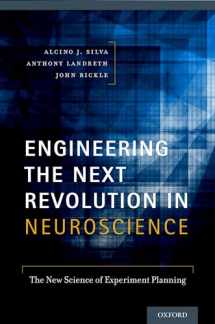
Engineering the Next Revolution in Neuroscience: The New Science of Experiment Planning
ISBN-13:
9780199731756
ISBN-10:
0199731756
Edition:
1
Author:
John Bickle, Alcino J. Silva, Anthony Landreth
Publication date:
2013
Publisher:
Oxford University Press
Format:
Paperback
204 pages
Category:
Mental Health
,
Cognitive Psychology
,
Behavioral Sciences
,
Cognitive
,
Psychology
FREE US shipping
Book details
ISBN-13:
9780199731756
ISBN-10:
0199731756
Edition:
1
Author:
John Bickle, Alcino J. Silva, Anthony Landreth
Publication date:
2013
Publisher:
Oxford University Press
Format:
Paperback
204 pages
Category:
Mental Health
,
Cognitive Psychology
,
Behavioral Sciences
,
Cognitive
,
Psychology
Summary
Engineering the Next Revolution in Neuroscience: The New Science of Experiment Planning (ISBN-13: 9780199731756 and ISBN-10: 0199731756), written by authors
John Bickle, Alcino J. Silva, Anthony Landreth, was published by Oxford University Press in 2013.
With an overall rating of 3.5 stars, it's a notable title among other
Mental Health
(Cognitive Psychology, Behavioral Sciences, Cognitive, Psychology) books. You can easily purchase or rent Engineering the Next Revolution in Neuroscience: The New Science of Experiment Planning (Paperback) from BooksRun,
along with many other new and used
Mental Health
books
and textbooks.
And, if you're looking to sell your copy, our current buyback offer is $0.54.
Description
Science is growing at a pace that exceeds our comprehension. This is no less true of neuroscience than any other discipline. Ambiguity about what is known and what has been disproven confounds researchers and hampers research planning. There are simply too many research articles and too few hours in the day for anyone to read all that is relevant, let alone distinguish the reliable results from the sketchy ones. Engineering the Next Revolution in Neuroscience explores the proposal that we can overcome these obstacles to scientific progress, and revolutionize neuroscience, by using a framework to map the experimental record. With case studies from learning and memory research, the authors show that we can construct networks of experimental research that make the state of our knowledge manifest. Armed with maps of experiments, scientists can determine more efficiently what their fields have accomplished and where the unexplored territories still reside.


We would LOVE it if you could help us and other readers by reviewing the book
Book review

Congratulations! We have received your book review.
{user}
{createdAt}
by {truncated_author}


